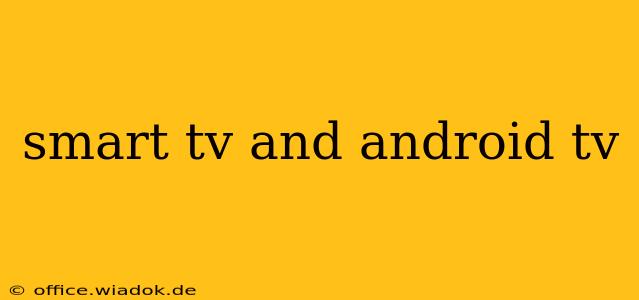Choosing a new television can feel overwhelming. Beyond screen size and resolution, you're faced with a confusing array of smart TV platforms. Two of the most popular are Smart TV and Android TV. While both offer access to streaming apps and online content, they differ significantly in features, functionality, and user experience. This comprehensive guide will break down the key differences to help you decide which is the best smart TV platform for your needs.
Understanding Smart TV
The term "Smart TV" is a broad umbrella term. It simply refers to a television that offers more than just basic broadcast viewing. Essentially, any TV with internet connectivity and access to streaming apps can be considered a smart TV. However, the "smart" features and the user interface vary greatly depending on the manufacturer (Samsung, LG, Sony, etc.). Each brand typically uses its proprietary operating system and app store.
Pros of Smart TVs:
- Wide Variety of Brands and Models: You'll find Smart TVs from numerous manufacturers, offering a wide range of screen sizes, resolutions, and price points.
- Often Integrated with Home Ecosystems: Many Smart TVs seamlessly integrate with other smart home devices and platforms.
Cons of Smart TVs:
- Inconsistent User Experience: The user interface and app selection can vary significantly between brands, leading to an inconsistent experience.
- App Availability Can Vary: While most popular streaming apps are available, the availability of niche or less popular apps may vary depending on the brand and model.
- Software Updates Can Be Inconsistent: The frequency and reliability of software updates can differ across brands.
Decoding Android TV
Android TV is a specific smart TV operating system developed by Google. It's licensed by various TV manufacturers, meaning you'll find it on TVs from brands like Sony, TCL, Philips, and more. Android TV offers a consistent user experience across different TV models that utilize the platform.
Pros of Android TV:
- Consistent User Experience: The interface and functionality remain largely the same across different Android TV models, making it easier to navigate.
- Extensive App Selection: Access to the Google Play Store provides a vast library of apps, including streaming services, games, and more.
- Google Assistant Integration: Built-in Google Assistant voice control allows for hands-free operation, making it easy to search for content, control smart home devices, and more.
- Chromecast Built-in: Seamlessly cast content from your Android or iOS devices to your Android TV.
Cons of Android TV:
- Fewer Manufacturer Options Compared to Generic Smart TVs: While many manufacturers offer Android TV, the selection is still less diverse than the overall smart TV market.
- Potential for Bloatware: Some manufacturers may include pre-installed apps that you might not want or use.
Smart TV vs. Android TV: A Head-to-Head Comparison
| Feature | Smart TV | Android TV |
|---|---|---|
| Operating System | Proprietary, varies by manufacturer | Google's Android TV |
| User Interface | Varies greatly by manufacturer | Consistent across different TV models |
| App Store | Varies by manufacturer | Google Play Store |
| App Selection | Generally good, but can vary significantly | Extensive |
| Voice Control | Often available, but functionality varies | Google Assistant integrated |
| Casting | Functionality varies | Chromecast built-in |
| Manufacturer Variety | Very High | Moderate |
The Verdict: Which Smart TV Platform is Best for You?
The best choice depends on your priorities. If you prioritize a wide selection of brands and models and are less concerned about a consistent user experience, a generic Smart TV might suffice. However, if you value a consistent user experience, a large app selection, Google Assistant integration, and Chromecast functionality, then Android TV is likely the better option. Consider your individual needs and preferences carefully before making your decision.

